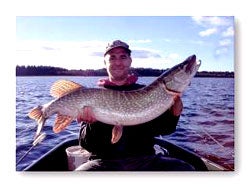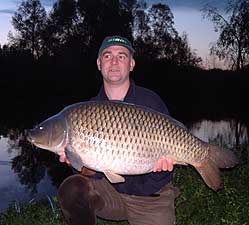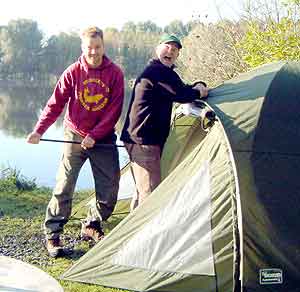After looking at some of the recent press reports and even listening to accounts of big fish captures by people whom I class as friends I’m beginning to believe that many anglers are seriously losing the plot. The whole fundamental reason for just being out there is rapidly disappearing into one great clamour for recognition or some kind of approval from our ‘peers’. Lets face it, we all want to catch bigger and bigger fish but we need to ask ourselves at what cost? I’ve known relationships, marriages and work prospects collapse due to this obsession and the whole situation seems to be getting worse by the season.
First of all what exactly is angling about? Well, to me at any rate, it is about enjoyment, pure and simple, nothing else matters. If you are not enjoying your fishing then you should stop, take a long look at what you are doing and try a different approach. If you are getting disillusioned (and I bet a few people reading this are, yet don’t want to admit it to themselves) and you don’t sit back and take stock of what you are doing, you will inevitably drift away from this fantastic sport of ours. The way I see it is that all the talk of personal bests, and the comparisons of these, is causing more pressure to be successful. Personal Best CV’s are even being used to ‘pigeon-hole’ anglers in terms of ability. “Look at his big fish list, he must be a much better angler than him,”…….”So-and so’s had forty-five double-figure barbel, where as such-a-body’s only had two, he’s not in the same league”. What absolute rubbish. What makes a good fisherman? How about taking the really important factors into account like, how often does he fish? Where does he live? Have his fish come from a variety of venues? Does he catch consistently from stillwaters and rivers alike? Could he hold his own in a match on the local canal? The list is endless.
Going hand in hand with this, an angler should also be judged (always assuming he needs to be!) on the number of ‘rod hours’ that are available to him, or indeed that he chooses to take. Let’s face it, if you’re lucky enough to have the kind of job and lifestyle which means you can fish whenever and wherever you want to then of course your going to catch a few good fish, but does this make you a good angler? I think not. This isn’t to say that those lucky sods who’s angling time is not restricted are not good anglers, a lot of them are of course, but I know from experience that there are a lot of guys who are catching some good fish purely on a ‘living on a water’ basis. Let’s face it, if you get onto a going swim, then stay on there for days, even weeks at a time, inevitably sooner or later your chosen target, be it carp, bream, barbel, tench or even roach, will get caught.
Skill and experience, or a time bandit? The angler who spends the week working, then at the weekend arrives at his chosen water for an overnight session, has usually put a lot of effort into this valuable night’s fishing long before he even casts a bait. He will have spent his evenings after work plumbing the lake, watching for signs of feeding or rolling fish, will have identified their patrol routes and will have forged a plan of attack in a bid to utilise his precious fishing time to the maximum. When he does have a result there is little doubt that he undoubtedly used his skill and experience to locate and eventually catch his quarry. As well as this he will have learned a great deal from the experience and will glean an unbelievable mount of satisfaction from the capture. Whereas the guy who, along with one of his mates, rotates a known swim, on a known water, from May to August before eventually catching a monster has certainly, in my opinion, achieved far less than the former.
In a rut Whilst on the subject of enjoying your fishing I’ll give you a couple of examples to emphasise my point. I used to fish for pike in my local north-west. Every weekend I would spend all day Saturday drowning a couple of herrings or mackerel on the off chance that something decent would come to call. I could have used livebaits and sometimes did, but invariably the bigger fish, although not as plentiful, fell to the deads. I didn’t want to catch jacks, I didn’t even want doubles (sad now, I know) – it had to be 20lb-plus or I wasn’t interested, so I stuck with the drudgery of fishing static deadbaits. Eventually it got so bad that I would spend half the day looking at my watch wishing it was time to go home – what a total waste of time!
A 6-pounder at any cost Another good example is one of a friend of mine, like myself, he too had long shared an ambition to catch a six-pound chub from the River Ribble. In his quest he fished on every night that the river was fishable for two consecutive winters. It became an obsession, and for him the fishing stopped being fun and became an ordeal, something to be endured rather than enjoyed. Often he would phone me at midnight after six hours on the bank, to tell me what an awful time he was having and how he was praying for the magical six so he never needed to fish the Ribble again. Eventually he caught it, I’m not sure if he was elated or relieved but I do know he doesn’t fish the Ribble now. He gave up his permits, in fact he doesn’t fish rivers anymore…..burnout maybe? What I am sure about however, is when one does come my way, and it will, it will have come on a short session, I will be enjoying myself at the time and I will return for more of the same be they smaller or larger specimens. Single species angling – I’d have given up before now
No doubt one or two people who read this will be thinking “he’s having a go at me”…..well whoever you are, I can assure you that I’m not. This piece isn’t directed at any individual in particular, it’s purely an observation of how I see fishing creeping into a ‘catch at all cost’ mentality. Others will say “Oh, he’s just jealous…..he can’t fish as often as me and consequently is just bitter.” Again I can assure the reader this is definitely not the case. Sure, I wouldn’t mind getting a bit more time on the bank – who wouldn’t – but for it to take over my life? No thanks. Getting it in perspective I have a decent job, a family with two lovely daughters, I still play amateur football, I take non-angling holidays and I have circles of friends outside angling. In short I have a life and I wouldn’t swap it for anyone else’s. Think about it for a moment, just for once forget the next double-figure barbel or your quest for the next record bream. Wouldn’t you like to cast a waggler tight to a patch of lily pads, fishing maggots on an 18’s hook and just catch what comes along? Wouldn’t you just love to watch the little red tip bobbing across the surface as another 3oz rudd snatches the bait on its descent…….go on, you know you want to! |
Welcome!Log into your account
















